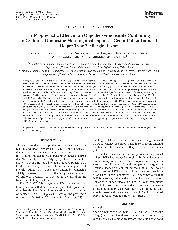摘要
Background. Over 10% of entire population in Japan suffer from allergic diseases induced by Japanese cedar pollen (JCP) every spring. In terms of preventive medicine, it has become a matter of urgency to establish successful prophylactic and therapeutic strategies for controlling the disorders. The effect of an oligodeoxynucleotide containing a cytidine-guanosine motif (CpG ODN) on the regulation of immune responses induced by JCP was investigated in this study. Methods. BALB/c mice were inoculated with CpG ODN intraperitoneally before intranasal sensitization to JCP. Cellular infiltration in the lung of BALB/c mice after treatment with CpG ODN or JCP was performed by hematoxylin and eosin (H&E) staining. Antibody titers and cytokines levels were determined by ELISA. Results. Intranasal inoculation of BALB/c mice with JCP induced a T-helper type 2 (Th2-type) dominant immune response, as characterized by the production of interleukin (IL)-4 and IL-5 in the lung and of JCP-specific IgE antibody in serum. Prior intraperitoneal administration of CpG ODN to mice suppressed the subsequent JCP-induced antibody production and infiltration of inflammatory cells in the lung. The inhibitory mechanism of CpG ODN seemed to be attributable to a CpG ODN-induced Th1-type dominant environment, which down-regulated Th2-type response subsequently induced by JCP allergen sensitization. Furthermore, administration with CpG ODN decreased the production of JCP-induced IL-17, which has been found to play a pivotal role in several inflammatory diseases including allergic asthma. The decreased production of IL-17, together with reduced secretion of IL-4 and IL-5, may contribute to diminish the inflammation in the lung of JCP-sensitized mice. Conclusion. This work provides evidence that the CpG ODN has a prophylactic effect on the JCP-induced Th2-type allergic responses by establishing or restoring a Th1-type shift of immune environments.
- 出版日期2011-11
- 单位中国医科大学
